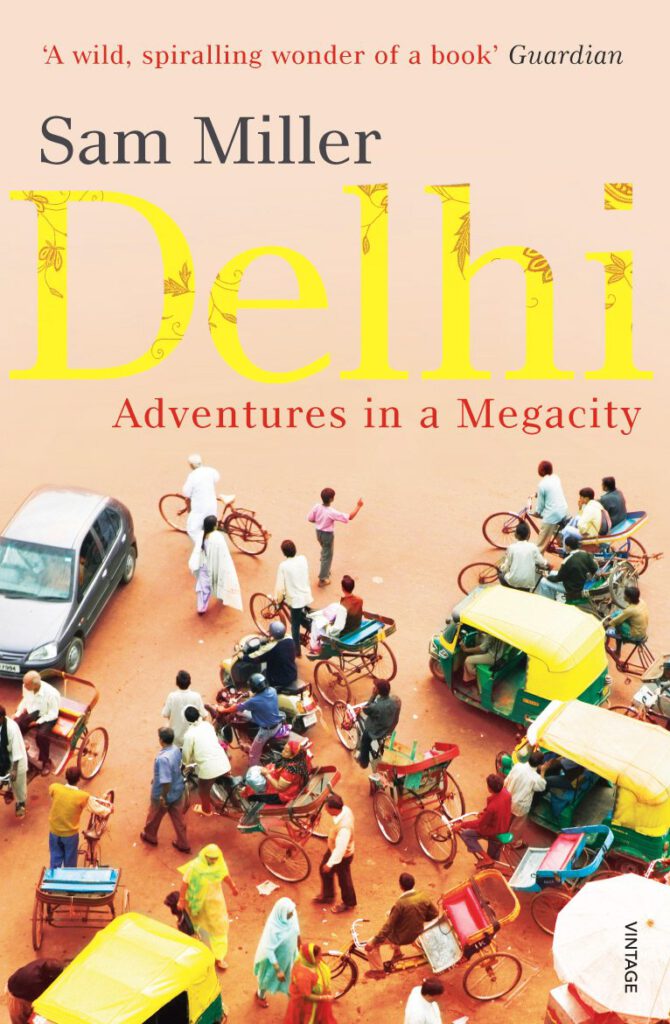Sam Miller, Vintage 2010

Sam Miller is quick to tell us that he loves walking in strange cities. So do I. And it is this that has always bothered me about Delhi, a city I have never visited but have often longed to see: how will I get around it? I don’t want to hire a car or an autorickshaw. And apparently women shouldn’t travel alone by bus. So can one walk? I know no better means of locomotion, especially if you really want to see and understand things. For all these reasons I was heartened when I picked up Sam Miller’s Delhi: Adventures in a Megacity. And when I saw the following line, which the author delivers to an auto-addict who is offering him a lift: ‘I don’t drive. And, well, I really want to walk,’ I knew I was in the company of a kindred spirit. When he says this kind of thing, Miller tells us, people look at him with pity and disbelief, or with embarrassment, as if he were a bit touched. I’m used to this reaction too. When I go to pick up my son from school, in foul-weather gear and yomping boots, mothers in spiky heels emerging from SUVs look at me with pity and disbelief. My son isn’t yet of an age to be embarrassed. So, safe in the knowledge that Miller and I were on the same wavelength, I set off with him, in search of a vast and unknown city. Everything in the book happens at street level. We don’t (or extremely rarely) go inside people’s apartments or office buildings. We don’t join them at social functions or in restaurants. We never really ‘meet’ anyone, we have brief encounters, the stuff of a vagrant’s life, with prison warders, rag-pickers, funeral directors, pirated computer software vendors, stall-holders, janitors. The encounters may be brief but they are not superficial. They are illuminating, sometimes amusing, often moving. And I learned a lot. Not just about Delhi’s geography, monuments, traffic problems, urban planning, religious groups and politics. But about geocaching and SimCity, about the Brahma Kumaris and what ‘sealing’ a business means. I even have a new verb to add to my vocabulary: to prepone, meaning to do something earlier than you planned. I loved the story of the bulldozed mosque and the incident of the ‘fresh fruit salad’, not to mention the Hotel Alka, which advertises itself as ‘the best alternative to luxury’. The New Statesman reviewer who said that ‘For all its entertaining eccentricities Delhi is careful to maintain a strong sense of the city’s sad heritage of religious factionalism, pollution, rioting, poverty and crime’ completely fails to catch the spirit of this book, making it sound like a worthy, brown-rice sort of endeavour leavened by a few off-the-wall jokes. It is nothing like that. It is true that Miller tells it like it is, but he doesn’t preach, he doesn’t campaign, he doesn’t soap-box. That is not to suggest that we don’t learn about pollution, rioting, poverty and crime. We do. But the overall tenor of the book is one of optimism. And enjoyment at the sheer infiniteness of Delhi. Sam Miller sets out to walk the city not because he is a charmingly batty Englishman, but because there are certain things that he would never see if he didn’t. And those things deserve to be documented. In documenting them, Miller is even-handed and compassionate. This is a book about a megacity, but what that means is that it is a book about human beings, in all their nutty multifariousness. Sam doesn’t judge, he observes. Above all, he writes with extreme tenderness towards his fellow man (and woman). What adds an extra piquancy is the fact that he has trouble with one of his knees. A fanatical walker with a gammy leg almost seems to stand as a microcosm of Delhi itself: something indomitable, irrepressible, insistent with life, and destined to succeed despite all difficulties. For the last few nights this book was my bedside reading. I enjoyed it hugely.
Reviewed by Annabel Barber.
Sam Miller is the author of Blue Guide India.






